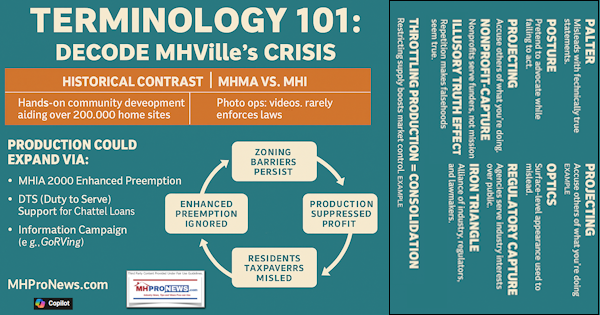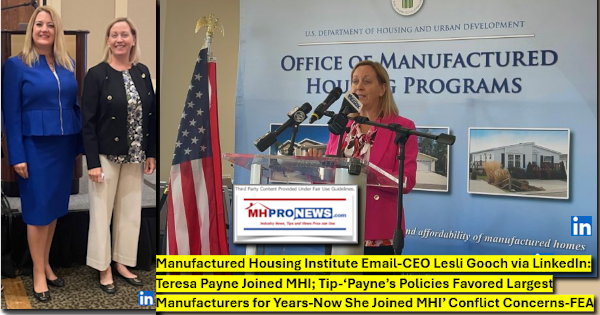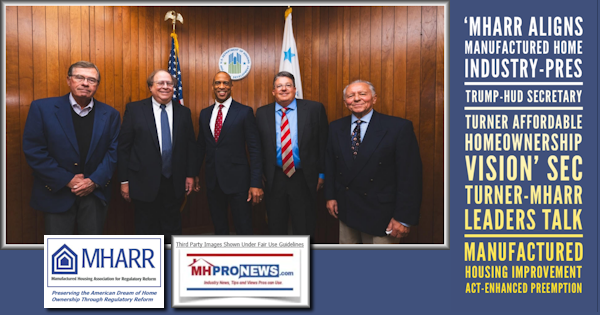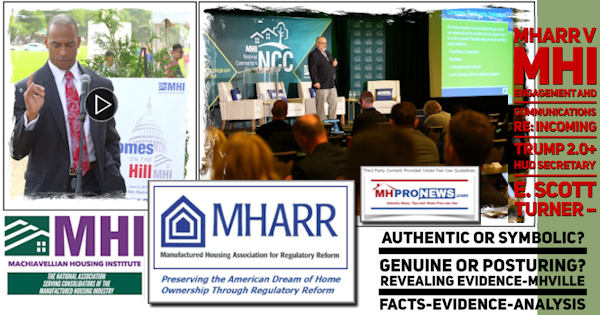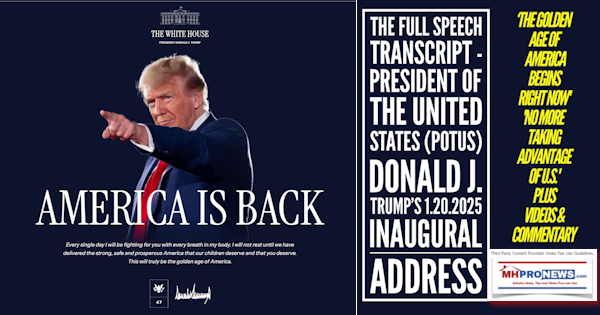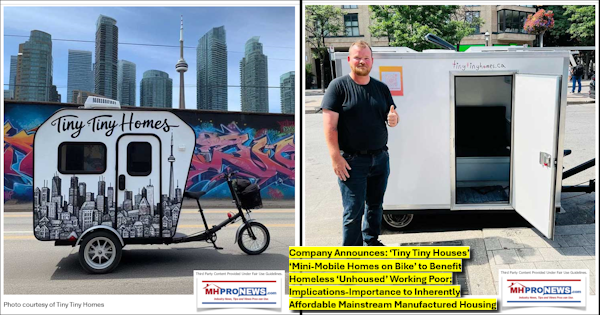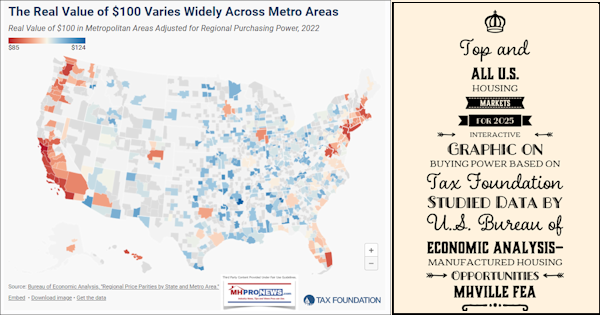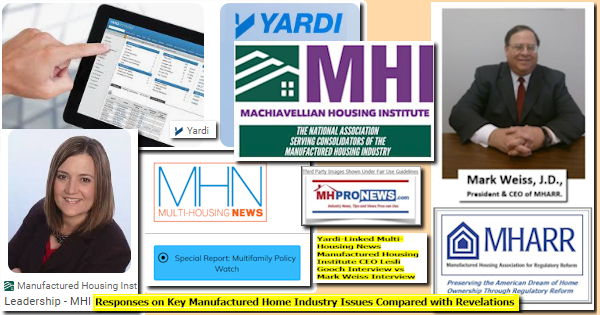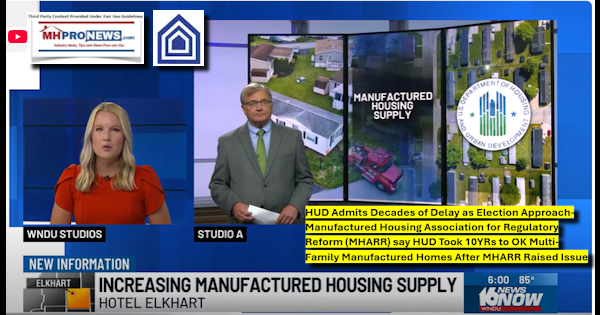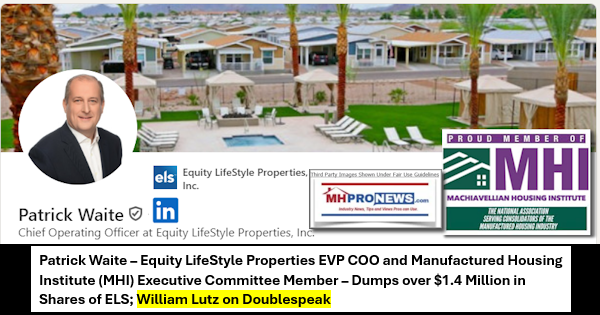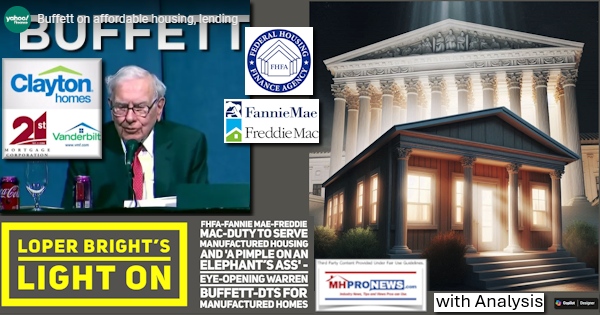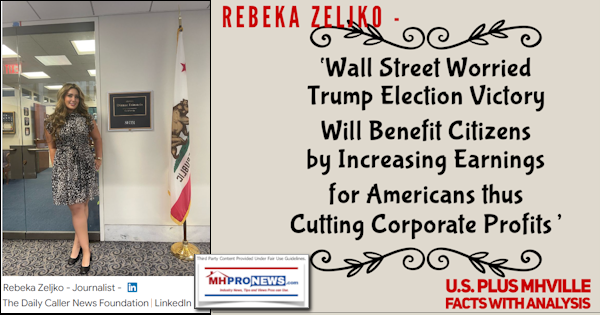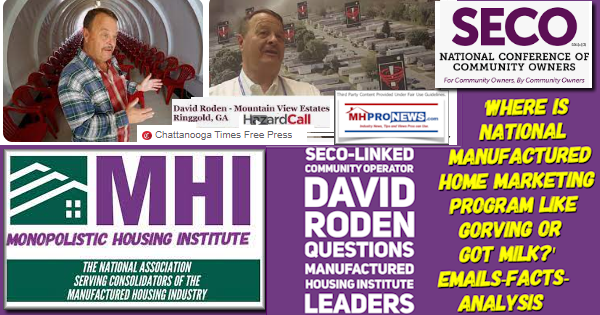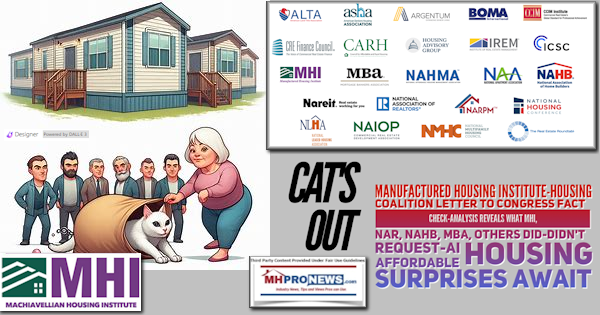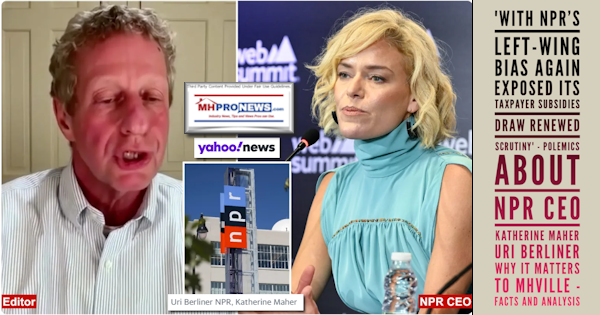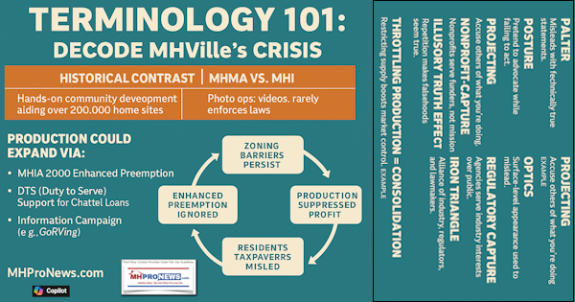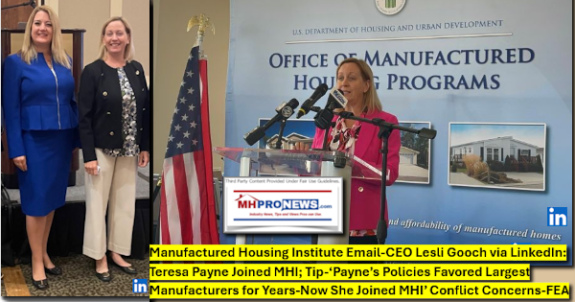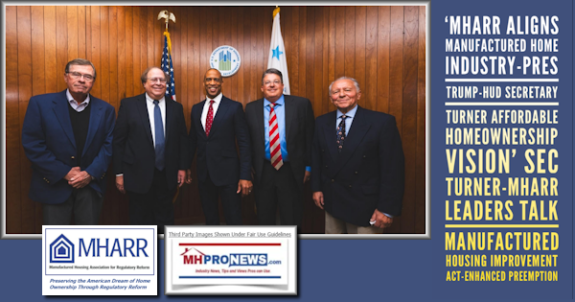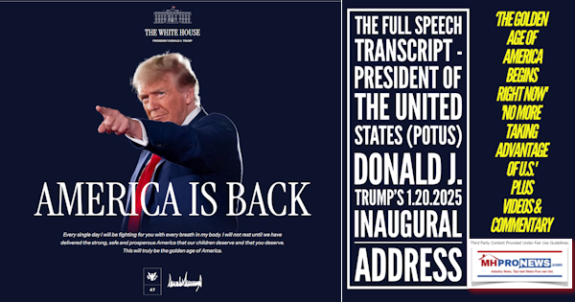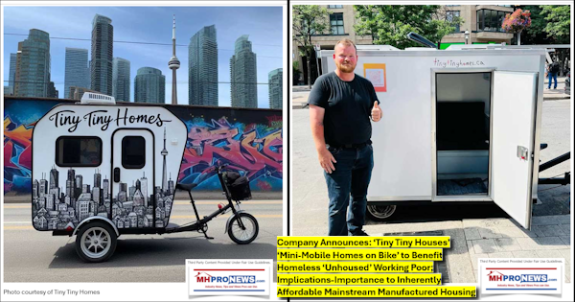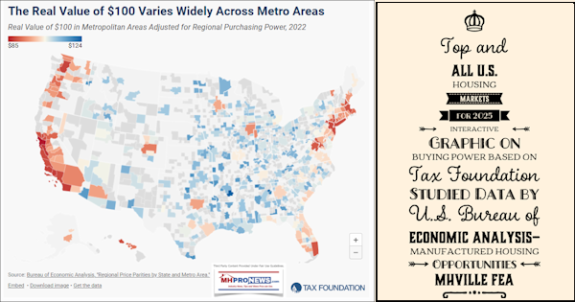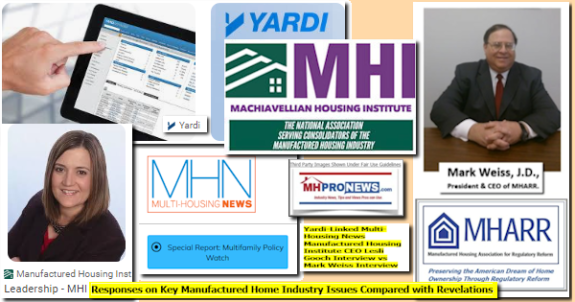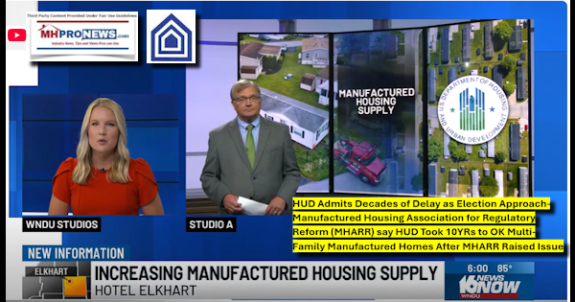We will save the international segment of this message for later, but don't think that means it's a footnote. The international factory builders and investors have their eyes on us and the North American housing market. That is important to know. So too is the association piece, so let's start with that before we weave the various topics together as to the challenges and opportunities that impact your career, organization and bottom lines in manufactured housing here in the U.S..
MHARR's Message and MH Associations
Continuing their more polite tone towards the 'other' national association, the Manufactured Housing Association for Regulatory Reform (MHARR) put out an industry report – linked here – that outlined the following issues they are tracking and working on, over and above HR 1779 and related. MHARR outlined the following:
-
The Big Picture on GSE Reform and Manufactured Housing.
-
HUD Program Budget Should Increase SAA Funding
-
New Windstorm Legislation underscores need for MH Protection.
-
EPA Publishes Proposed Formaldehyde Standards
-
MHCC Stagnation Continues
-
RV Definitions Status Update
Anyone engaged at one of the roughly 50 MH state or community associations knows there are an entirely different set of issues being dealt with at the grass roots level. Those are in addition to federal issues such as lobbying for HR 1779 to modify regulations that the Consumer Financial Protection Bureau (CFPB) has in mind for us. If CFPB's planned regulations are not amended prior to their becoming activated mid-January, 2014, it will be to the detriment of consumers and industry home sellers alike. So clearly this is an important issue.
MHARR has their initiatives, naturally MHI has their own for 2013 too.
The Manufactured Housing Institute's (MHI) agenda includes, but is not limited to, the following:
-
Dodd-Frank Finance Reform (think, HR 1779 and the 'soon to be filed' Senate companion bill).
-
Reform of Government Sponsored Enterprises (GSEs).
-
Tax Reform – Renew efforts to enact a long-term extension and increase the 45L tax credit for those producing energy efficient (Energy STAR) manufactured and modular homes.
-
DOE Energy Efficiency Standards for Manufactured Housing.
-
Manufactured Home Construction and Safety Standards – Aggressively urge HUD to issue code revisions and recommendations developed by the MHCC, develop an aggressive policy on preemption, and advocate for a non-career administrator to oversee HUD’s manufactured housing program.
Let's note that these aren't the only items on MHI's or MHARR's agenda. For instance, both would say that:
-
protecting federal pre-emption would be very important, or
-
the fire sprinkler/HUD Code issue is also on their radar, or
-
appointment for a non-career administration for the HUD Code MH program, among others.
The point of the recap above is to underscore the fact that our industry has its hands full on legislative and regulatory matters. When I speak with state, community or MHI execs and MHARR members, a common theme is they are spread thin on their association's finances. I can't think of one that would say 'no' to more members, or more revenue. Both are needed.
The irony is that at the very time America is in the thrones of an affordable housing crisis, the most affordable U.S. built housing is being marginalized.

The Affordable Housing Crisis
Writing in Democracy, a Journal of Ideas, Paul Bradley (president of ROC USA) and George McCarthy cited the following in the fall of 2012. In the…
”…State of the Nation’s Housing report, Harvard researchers identified a supply shortage of more than five million affordable housing units for low-income families. Moreover, because more than 40 percent of affordable units are occupied by higher-income families, the availability gap is actually seven million units.”
Bradley and McCarthy also stated:
“Today, more than 42 million families pay more than 30 percent of their pretax income to cover housing costs, and 20 million of them pay more than half. Further, only one in four families that would qualify for federal housing assistance currently receives it. And housing assistance funding is expected to decline in 2013 and likely will continue to decline as the country grapples with its fiscal challenges.”
They concluded their article by saying:
“It is incumbent on us to preserve and stabilize this naturally affordable housing stock. It is simply unacceptable to punish families that embody the national ideal of self-sufficiency by raising the cost of being poor.”
Without questioning the ideals behind subsidized housing, we have noted previously that community operators, retailers and others who sell manufactured homes often tell us that those subsidy programs pose a challenge to our industry. Conventionally built apartments or rental housing stock receiving subsidies creates an artificial competition for American's most affordable housing, modern manufactured homes.
How many millions of more manufactured homes would we see in the U.S., if there were no subsidized housing programs?
This is not an argument for or against subsidized housing. What it ought to be is thought provoking.
We could easily re-phrase the questions the following way. Why do conventional U.S. builders get subsidized, while manufactured housing professionals are overwhelmingly left out? Wouldn't it save tax payers billions annually if the support for slower, less efficient and more costly site building was removed?
China, Japan, Russia – the International Challenge – and you
No other manufactured housing publisher we monitor mentions or tracks international factory building anything like we do here at MHProNews.com. It would be a rare week on our Daily Business News blog without one or more news stories from Canada, Asia, Europe, Africa, Latin America, Australia or the islands that dot the world's "Seven Seas."
Automated Builder used to track foreign factory built housing events, but Don Carlson's publication sadly went away, as did the Manufactured Home Merchandiser magazine and so many others in print.
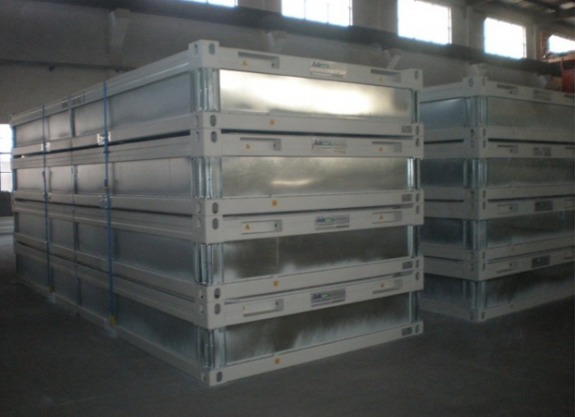 Now, you have MHProNews.com.
Now, you have MHProNews.com.
There are reasons we track international news. One reason is that they track us.
Another is that Japan – and more recently – China and Russia – have had hungry eyes on the U.S. market. The photo at the left is one example of an article we published about Chinese PreFabs being shipped overseas.
The international factory built housing scene also covets the tens of millions of affordable housing units needed worldwide, while our domestic industry tends to be less focused on those opportunities, perhaps because domestic U.S. political and economic issues keep our attentions on other matters.
Factory built housing has flowed between North America's nations for some years.
But when the Japanese, Chinese or Russians bring either billions of dollars, or tens of thousands of housing units or some combination of those to our country, "Katie, bar the doors" will be a cry that comes too late!
From time to time, I remind industry readers about this, because NO ONE else nationally is doing so.
Japanese and other international auto builders routinely take something like 13 of the top 20 selling models here in the U.S.. Fiscally crumbling Detroit's so called "Big Three" auto makers has also seen its share of international ownership. Some international automakers build a factory in the U.S., or invest here and/or ship cars to our shores made in other nations.
The auto example in this column was chosen very deliberately.
Toyota builds mods in Japan, not just cars.
Factory building is a process, a concept that other nations don't shy away from. It is U.S. factory built housing professionals that have all too often failed to step up and deal with the image issue that hobbles us in sales, politics, regulations, etc..
When international visitors go to an event, a factory or they hire surrogates to do so for them, do you think they are merely curious? I don't think so! There are more exciting places to journey to, here and abroad.
Be it direct competition via product and/or indirect engagement via investments, the international invasion felt in domestic markets for autos, pickups, SUVs, cross-overs and luxury cars will be felt in the ranks of factory builders – indeed all home builders – here in the U.S. too. We need to be prepared.
The Russians are coming
We monitor via our server the meta data of our visitors (readers). Please do not think, "NSA." I don't 'see you' on our pages, but our server knows which nation a visitor is in while you – or thousands of others are reading here – are on our MH Industry trade publishing website.
About 92% +/- of our steadily growing numbers of readers (website visitors) are U.S.. Canada used to be the number two among our readers here on MHProNews, but they are no longer!
The Russians have blown past the numbers of Canadian readers here. The Russians aren't alone. There are website visits – along with direct contacts – from companies based in China and Japan to MHProNews, among the others from around the world.
They all have an agenda. A business one. I'm not knocking it, we aren't saying it is sinister, I'm just telling or reminding you about it.
You will wake up one day to a headline you may or may not like that impacts factory-built housing news.
When that headline hits, it may already be too late to 'prepare.' Remember, it has happened in automotive. It is bubbling in the RV world. There are reasons why inquires to buy MHProNews have risen.
The international impact on housing will happen here in the U.S. to manufactured, modular – and conventional – home builders too.
Parallel Paths
My fellow industry professionals, the housing mess in DC will get fixed. The only questions are when, and who will win or lose in the mean time.
We believe in HR 1779, but mark my words, the issues will get fixed. For your sake and that of millions of MH home owners, I hope it is now.
Just as investors – such as Warren Buffett – look for sound corporate investment opportunities, that same pattern happens internationally. So some will benefit. But others will wake up and say, what the heck just happened?
We see lethargy in way too many places in our industry. There are too many comfort zones. Too many ruts that people are stuck in.
We as an industry could be roaring ahead, instead of slowly crawling back for two years towards 60,000 annual shipments. Think back! Recall that we did 372,000 new homes in 1998 and we exceeded 500,000 new in the days before the HUD Code was put into place. We could achieve higher new home sales levels without GreenSeco funny money financing of manufactured homes.
It pays to address our problems. Let me repeat that, it pays to address our political and image problems.
Consider some facts:
-
Manufactured housing state associations could more than double their budgets, just by shepherding a mere 10% of their industry pros to tap vigorously into ways to attract more customers with cash or good credit. Those pros who do, profit, period.
-
One loan product available today alone could raise MH Shipment levels by 150,000 annually. And there are many loan products beyond that one. Those who tap it now, profit, period.
-
As MHIndustry finance expert, Dick Ernst has publicly said, "There is no 'lack of capacity' among our industry's current lenders to fund loans for credit worthy buyers."
-
If we take the average “floor fee” going to a state association as being $100 (the fees are all over the map, but we will use that figure), and we grew back to the 200,000 annual shipment level, at the current single/multi-sectional mix, it would mean about $24 million more flowing to various state associations (not counting what goes to MHI, et al).
-
That growth back to more historic norm levels would also mean about 700 million more annually to the bottom lines of various industry companies. All such steps would help the industry's members be better prepared for the coming international moves into the MH Industry.
-
Not to be ignored is the potential growth in values for existing manufactured homes. Please remember that while we are addressing industry pros here, we are keenly mindful of the public and our customers.
 Every segment of the industry would benefit by increasing sales. Every part of the industry benefits with better image and more 'best practices' professionalism.
Every segment of the industry would benefit by increasing sales. Every part of the industry benefits with better image and more 'best practices' professionalism.
Associations work with service providers on a daily basis. Corporate giants, mid size or independent players, ditto.
We have to have parallel paths. You don't put all your eggs in one basket in the stock market, do you? Working more closely together – in lawful ways – would benefit all who do so.
We have to grow our way back to economic strength. Doing so will pay handsome rewards.
But make no mistake. If you don't act, someone else will. Nature abhors a vacuum.
So while our industry is understandably focused on DC or state related association issues, while Clayton is tuning up it's "Good Call" efforts with the Duck Dynasty stars, while mom and pops are scrambling this way or that, other forces are moving.
We need to wake up, drink the coffee, smell the roses and start promoting what we have like we really mean it. As 21st Mortgage's Tim Williams said as part of an interview we plan to publish for our July 2013 issue, we need to think of ourselves as a fraternity made up of manufactured housing professionals.
Please see Who's Missing. Please think, we have to do better, be more engaged now than ever before. The international scouts aren't coming, they are here. We've said it before, we are saying it again now.
You can benefit, or not, that part is your call. One sentence Boy Scout summary, be prepared. ##
(Graphic credits: from JapanTimes, MHProNews' Daily Business News and corporate sources)
PS: Check our many Exclusive and Red Hot Featured Articles for June and see the
other new stories at MHLivingNews.com too.
MHLivingNews.com=Re-Discovering and Spotlighting the MHLifeStyle
MHProNews.com = MHMSM.com = Industry News, Tips and Views Pros can Use
Services:B2BandB2CAds, Proven MH Marketing & Sales Systems, Websites other Industry Solutions.
Office –815-270-0500
latonyk@gmail.com or tony@mhmsm.com
http://www.linkedin.com/in/latonykovach= connect with me on Linkedin.
http://pinterest.com/latonyk/manufactured-home-lifestyle/
+++
Whether you think you can or whether you think you can't, you're right. – Henry Ford


